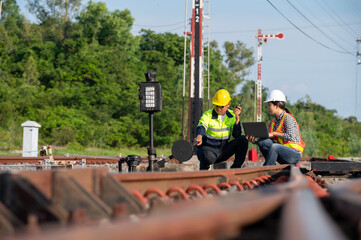An electric contractor takes on bigger projects than an electrician would. This includes creating electrical blueprints and serving as the point of contact for vendors and owners.
Electric contractors are professionals who specialize in the installation, maintenance, and repair of electrical systems in residential, commercial, and industrial buildings. Play a crucial role in ensuring that electrical systems are safe, efficient, and up to code.

They also offer a wider range of services, including backup power, wireless network, data, and voice/video systems. But what exactly sets an electric contractor apart from a regular electrician?
Safety
Whether working on a new construction project or upgrading existing structures, the electrical contractor must follow safety procedures. This can reduce the risk of accidents and injury to workers, as well as protect the structure from damage and fires caused by faulty wiring.
Electricians and their subcontractors are at the most risk for electrocution on a worksite. However, any construction worker who comes into contact with electricity may be injured. The most common causes of electrical injuries are direct contact with overhead power lines, overheated circuits, and faulty tools. Electrical contractors should follow the most up-to-date safety standards and procedures to prevent these accidents from occurring.
One of the most important duties of an electrical contractor is to perform an on-site survey to identify potential safety hazards. They should also inspect all equipment before beginning any work. They should use a site plan to mark the location of each hazard so that other crew members can be aware of it and take extra precautions.
Another important safety measure is to keep all electrical equipment away from water. If a power tool or piece of equipment falls into the water, it should be switched off before it is removed from the water. If the equipment cannot be immediately switched off, it should be marked as Out of Service.
It is also important to avoid overloading circuits, as this can cause them to overheat and potentially start a fire. An electrical contractor should always use multiple circuits to distribute the load of electric power. They should also make sure that all wires are properly insulated and covered to prevent accidental contact with them.
Finally, an electrical contractor should ensure that all power tools are in good condition and have been inspected by an electrician. They should never clean electrical equipment with water, as this can be deadly. They should also make sure that all electrical cords are plugged into ground-fault circuit interrupters (GFCIs), which can help to prevent accidents from occurring. GFCIs are especially useful on construction sites where many people are constantly using extension cords and other electrical equipment.
Experience
Electrical contractors have a lot of experience in the field. They have a wide range of skills and can work in any environment. They also have a good understanding of safety standards. An electric contractor needs to have a lot of experience to meet project demands. This will ensure that the job is completed safely and promptly.
One of the most important skills for an electric contractor to have is attention to detail. This is because they often work with dangerous equipment and need to be able to notice any mistakes that could cause harm. They also use their attention to detail when planning complex electrical projects, such as wiring a large building.
Communication is another important skill for an electric contractor to have. They frequently need to communicate with clients and other workers to complete their work. They use verbal communication to explain their work and give feedback to others. They also use written communication to send emails and correspondence with their clients.
Many electrical contractors have a wide variety of skills, including the ability to work with computer hardware. They use these skills when planning their projects, creating visual representations of their work, and completing administrative tasks like managing employee payroll or tracking expenses. They also use their computer knowledge to help them troubleshoot problems on the job site.
Electricians are required to obtain a license before they can start working on projects. Licensing requirements vary by state, but they generally require several years of experience and successful completion of an exam. Many electricians get their licenses by completing an apprenticeship program or attending a vocational school. In addition, they may choose to join a trade association or an organization that offers continuing education and training.
Licenses
Having verifiable experience as an electrician is a major requirement for getting an electrical contractor license. Typically, states require between 6,000 and 8,000 hours of work experience before a candidate can take the exam to become licensed. Experience can be gained through full-time education or a combination of both. Some schools offer courses that can be substituted for some of the required experience.
Most cities and counties require that an electric contractor obtain a permit for installations, replacements, or repairs within commercial or residential structures. These permits can be obtained through local government offices or electrical boards. Failure to secure a permit can result in civil penalties, which vary by state and may include fines of up to $5,000 per violation.
Some electrical contractors choose to pursue national certifications, which can be beneficial for gaining new business opportunities. While these national certifications are not required by most states, they can demonstrate a higher level of knowledge and proficiency in specific areas of the electrical industry. Depending on the certification, some electrical contractors can also receive additional benefits and perks from employers or clients, such as discounted rates.
In addition to securing a license and obtaining a permit, electrical contractors need to comply with all state and local business regulations. Failure to follow these rules can lead to civil penalties that vary by state, and in some cases, an entire electrical licensing business could be revoked or suspended.
During the licensing process, electrical contractors will need to provide personal and financial information. They must also submit a background investigation report to the licensing and examination department. Some state requirements are more strict than others, including a minimum amount of work experience or schooling. In some cases, an electrical contractor can get a waiver for these requirements by passing a special exam. In most cases, however, a high school diploma is the minimum educational requirement for an electric contractor.
Electric contractors must be licensed and insured to practice their profession. They undergo extensive training and education to acquire the necessary skills and knowledge. They must also stay up to date with the latest advancements in electrical technology and regulations to provide the best service to their clients.
Personality
Whether working independently or with an established organization, an electric contractor needs excellent communication skills. This is because you will be interacting with many different people on job sites, including managers, contractors, architects, and crews. It is also important for you to write your ideas and thoughts, as well as comprehend written materials. Without this, you may not be able to get your work done correctly and could even put others in danger.
A good electrician is also a person who can think outside of the box and come up with creative solutions to problems. In addition, they are typically attentive to detail and enjoy figuring out mechanical things. This type of personality is referred to as an ISTP by the personality test.
Another trait of a good electrician is the ability to keep their emotions in check and stay focused on the job at hand. This is because there are often when you are dealing with dangerous situations that require you to stay calm and act quickly. Ultimately, a reliable electrical contractor is someone you can trust to do the right thing and take the necessary steps to ensure everyone’s safety.
In addition to new construction, electric contractors also handle electrical upgrades and renovations. They may be called upon to upgrade outdated electrical systems, install new appliances or fixtures, or rewire a building to meet changing needs. These projects require careful planning and coordination to minimize disruptions to the occupants of the building.
Maintenance and repair are also essential aspects of an electric contractor’s job. They regularly inspect electrical systems to identify any potential issues and perform routine maintenance to keep them running smoothly. In the event of an electrical problem, such as a power outage or faulty wiring, electric contractors are called upon to diagnose and fix the issue. They have the knowledge and tools to troubleshoot electrical problems and ensure that the system is restored to proper working order.
In conclusion, electric contractors are highly skilled professionals who play a vital role in the construction, maintenance, and repair of electrical systems. Their expertise ensures that electrical systems are safe, efficient, and reliable, making them an essential part of any building project.

